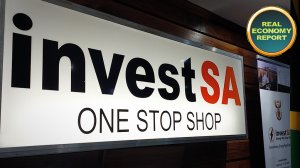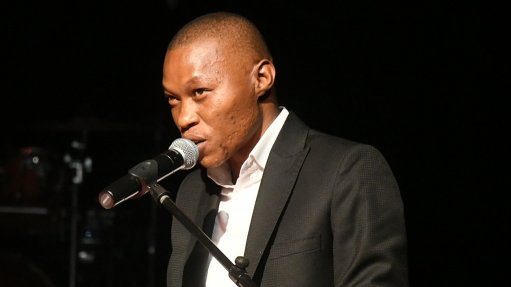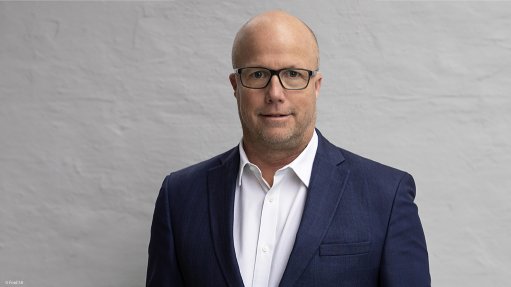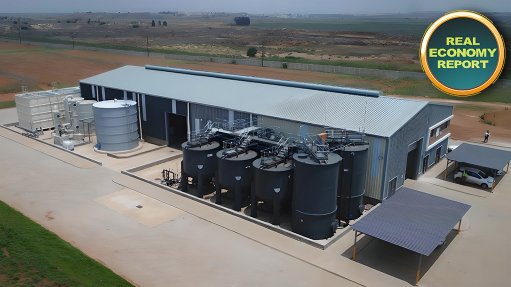Inside the Energy One Stop Shop and its drive to fast-track electricity project applications

Inside the Energy One Stop Shop and its drive to fast-track electricity project applications
From Creamer Media in Johannesburg, this is the Real Economy Report.
Sashnee Moodley:
The Energy One Stop Shop, or EOSS, which was officially launched by Trade, Industry and Competition Minister Ebrahim Patel in July, is in the ramp-up phase of a four-stage process aimed at fast-tracking the regulatory approvals required for new electricity projects to be connected to the grid. Cameron Mackay tells us more.
Cameron Mackay:
Launched by the InvestSA organisation, which is part of the Department of Trade, Industry and Competition (dtic), the EOSS initiative is already overseeing hundreds of applications.
The EOSS is also capacitating itself, with the help of several departments and partners, to meet its objectives.
Chief director Lester Bouah tells Engineering News the first stage has been completed and involved establishing the EOSS facility with dedicated personnel, a website, a registration portal for energy projects, and a mapped process showing where projects are in the approval process.
In phase two, the EOSS will be scoping provincial and municipal processes and building capacity at these two spheres.
In phase three, a single, electronic application process will be implemented with automated feedback.
In phase four, the full project will be in place, covering both immediate blockages and looking at a wider reform programme.
EOSS Chief director Lester Bouah…
Cameron Mackay:
The EOSS has also engaged with energy developers who have used the portal, and encourages more developers to engage with the portal and provide feedback to improve the process.
The creation of the EOSS is an acknowledgement by government that the red tape governing energy projects are onerous, particularly as applications need to be submitted to up to 14 different government departments.
Bouah says that government departments have now given a commitment to President Cyril Ramaphosa that energy project applications will be streamlined and prioritised to help tackle the growth-sapping loadshedding crisis.
EOSS Chief director Lester Bouah...
Cameron Mackay:
Given the difficulty of requesting officials from multiple departments to be constantly available to assist with applications, particularly in a context where workflow is inconsistent, the EOSS has opted for a model of having internal administrators dealing directly with applications.
These administrators then communicate with departmental representatives on the technical working group to secure technical advice.
The EOSS does, however, have funding support from the International Finance Corporation (IFC), the World Bank and the Foreign, and Commonwealth and Development Office (FCDO) of the UK, who’re assisting the EOSS to map the processes at a national and municipal level for phase two.
The EOSS is also working with the South African Local Government Association (Salga) to capacitate local municipalities, as many do not have the necessary skills and knowledge to evaluate energy projects and the economic value of such projects in a fiscally constrained environment.
Cameron Mackay:
By the end of the third phase, the EOSS will have implemented an electronic system, and will migrate away from the current manual model.
The EOSS has a partnership with the Companies and Intellectual Property Commission, which has offered its in-house support to engineers that can help build an electronic tracking system.
The EOSS also has an engagement in its memorandum of understanding with the Energy Council of South Africa and other energy-sector associations, who will also contribute to facilitating private sector involvement and funding.
The council and involved associations can advise the EOSS’ tracking and monitoring methodologies, and what is needed to improve the energy project application process, based on feedback from private-sector association members.
Bouah explains that the EOSS is likely a temporary measure, currently needed owing to South Africa’s challenges with Eskom and energy supply.
However, the EOSS has, together with the World Bank, began developing standard operating procedures that will be made “as generic as possible”, so it be adjusted if needed for dealing with similar challenges in other local sectors going forward.
The EOSS has also shared these standard operating procedures with departments, as while some departments have them, others don’t.
Because Eskom is part of the EOSS working group, the EOSS is able to communicate directly with the utility to address issues around connecting projects.
EOSS Chief director Lester Bouah...
Cameron Mackay:
Bouah stresses the importance of adhering to checks and balances within the process of onboarding local energy projects, and correctly navigating through necessary legal and regulatory processes.
The EOSS reports to various structures, as well as directly to relevant department Ministers.
EOSS Chief director Lester Bouah...
Cameron Mackay:
In addition, the Industrial Development Corporation (IDC), National Empowerment Fund and the dtic have set aside resources to assist companies with energy related challenges. To date, the department and entities have approved projects worth R294-million.
Bouah adds that the EOSS has received many inquiries from developers for incentives as well as funding around energy related initiatives.
EOSS Chief director Lester Bouah...
Cameron Mackay:
Bouah explains that InvestSA has various divisions that focuses on five key sectors of the local economy, and also supports the development of special economic zones.
This is done to facilitate domestic as well as foreign direct investment within South Africa, and to assist investors who are looking to navigate the local regulatory space to implement local projects and stimulate the economy.
EOSS Chief director Lester Bouah...
Sashnee Moodley:
That’s Creamer Media’s Real Economy Report. Join us again next week for more news and insight into South Africa’s real economy. Don’t forget to listen to the audio version of our Engineering News daily email newsletter.
Comments
Announcements
What's On
Subscribe to improve your user experience...
Option 1 (equivalent of R125 a month):
Receive a weekly copy of Creamer Media's Engineering News & Mining Weekly magazine
(print copy for those in South Africa and e-magazine for those outside of South Africa)
Receive daily email newsletters
Access to full search results
Access archive of magazine back copies
Access to Projects in Progress
Access to ONE Research Report of your choice in PDF format
Option 2 (equivalent of R375 a month):
All benefits from Option 1
PLUS
Access to Creamer Media's Research Channel Africa for ALL Research Reports, in PDF format, on various industrial and mining sectors
including Electricity; Water; Energy Transition; Hydrogen; Roads, Rail and Ports; Coal; Gold; Platinum; Battery Metals; etc.
Already a subscriber?
Forgotten your password?
Receive weekly copy of Creamer Media's Engineering News & Mining Weekly magazine (print copy for those in South Africa and e-magazine for those outside of South Africa)
➕
Recieve daily email newsletters
➕
Access to full search results
➕
Access archive of magazine back copies
➕
Access to Projects in Progress
➕
Access to ONE Research Report of your choice in PDF format
RESEARCH CHANNEL AFRICA
R4500 (equivalent of R375 a month)
SUBSCRIBEAll benefits from Option 1
➕
Access to Creamer Media's Research Channel Africa for ALL Research Reports on various industrial and mining sectors, in PDF format, including on:
Electricity
➕
Water
➕
Energy Transition
➕
Hydrogen
➕
Roads, Rail and Ports
➕
Coal
➕
Gold
➕
Platinum
➕
Battery Metals
➕
etc.
Receive all benefits from Option 1 or Option 2 delivered to numerous people at your company
➕
Multiple User names and Passwords for simultaneous log-ins
➕
Intranet integration access to all in your organisation



















